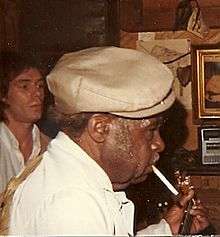Henry Townsend (musician)
| Henry Townsend | |
|---|---|
 Henry Townsend - St. Louis 1983 | |
| Background information | |
| Birth name | Henry Jesse James Townsend |
| Born |
October 27, 1909 Shelby, Mississippi, United States |
| Died |
September 24, 2006 (aged 96) Mequon, Wisconsin, U.S. |
| Genres | Blues |
| Occupation(s) | Singer, musician |
| Instruments | Guitar, piano |
| Years active | 1920s–20000s |
Henry "Mule" Townsend (October 27, 1909 – September 24, 2006)[1] was an American blues singer, guitarist and pianist.
Career
Townsend was born Henry Jesse James Townsend, in Shelby, Mississippi,[1] and grew up in Cairo, Illinois. He left home at the age of nine because of an abusive father and hoboed his way to St. Louis, Missouri. He learned guitar while in his early teens from a locally renowned blues guitarist known as "Dudlow Joe".[2]
By the late 1920s he had begun touring and recording with pianist Walter Davis, and had acquired the nickname "Mule" because he was sturdy in both physique and character. In St. Louis, he worked with some of the early blues pioneers, including J.D. Short.[2]
Townsend was one of the only artists known to have recorded in nine consecutive decades. He first recorded in 1929,[3] and remained active up to 2006. By the mid 1990s, Townsend and his one-time collaborator Yank Rachell were the only active blues artists whose careers had started in the 1920s. He recorded on several different labels, including Columbia Records and Folkways Records.[4]

Articulate and self-aware with an excellent memory, Townsend gave many invaluable interviews to Blues enthusiasts and scholars. Paul Oliver recorded him in 1960 and quoted him extensively in his 1967 work Conversations with the Blues.[5] Thirty years later, Bill Greensmith edited thirty hours of taped interviews with Henry to produce a full autobiography, giving a vivid history of the Blues scene in St Louis and East St Louis in its prime.[6]
In 1985 he received the National Heritage Fellowship in recognition of being a master artist. In 1995 he was inducted into the St. Louis Walk of Fame.[7]
Townsend died, at the age of 96, on September 24, 2006, at St. Mary's Ozaukee Hospital, Mequon, Wisconsin, just hours after having been the first person to be presented with a 'key' in Grafton's Paramount Plaza Walk of Fame.
While [Henry Townsend] did not scorn his old recordings, he had no taste for spending his later years simply recreating them.
Blues, for him, was a living medium, and he continued to express himself in it, most remarkably in his songwriting.
-Tony Russell, The Guardian
On February 10, 2008, Townsend was posthumously awarded a Grammy, his first, at the 50th Annual Grammy Awards. The award, in the Best Traditional Blues Album category, was given for his performances on Last of the Great Mississippi Delta Bluesmen: Live In Dallas, released by The Blue Shoe Project. Townsend's son, Alonzo Townsend, accepted the award on his behalf.
On December 4, 2009, Henry Townsend was added to the Mississippi Blues Trail.[8]
Selected discography
- 1966: Blues Rediscoveries (Folkways Records)
- 1970: The Country Blues: Vol. 2 (Folkways Records)
- 1973: Henry T. Music Man (Adelphi Records AD1016)
- 1980: "Mule" (Nighthawk)
- 1984: The Blues in St. Louis, Vol. 3: Henry Townsend (Folkways Records)
- 1998: "The 88 Blues" (Blueberry Hill Records)
- 2001: The Real St. Louis Blues (Arcola Records, recorded 1979)
- 2003: Classic Blues from Smithsonian Folkways (Smithsonian Folkways)
- 2004: "My Story" (APO Records)
- 2007: Last of the Great Mississippi Delta Bluesmen: Live in Dallas (Blue Shoe Project)
- 2008: Classic Piano Blues from Smithsonian Folkways (Smithsonian Folkways)
See also
References
- 1 2 Eagle, Bob; LeBlanc, Eric S. (2013). Blues - A Regional Experience. Santa Barbara: Praeger Publishers. p. 189. ISBN 978-0313344237.
- 1 2 Barlow, William (1989). "Looking Up At Down": The Emergence of Blues Culture, pp. 268-69. Philadelphia: Temple University Press. ISBN 0-87722-583-4.
- ↑ Russell, Tony (1997). The Blues: From Robert Johnson to Robert Cray. Dubai: Carlton Books Limited. p. 12. ISBN 1-85868-255-X.
- ↑ Russell, Tony (1997). The Blues - From Robert Johnson to Robert Cray. Dubai: Carlton Books. pp. 177–8. ISBN 1-85868-255-X.
- ↑ Oliver, Paul. (1997). Conversations With the Blues. Second edition. Cambridge Unvisersity press. ISBN 0521591813
- ↑ Townsend, Henry. (1999). A Blues Life: As Told to Bill Greensmith. University of Illinois Press. ISBN 0-252-02526-1
- ↑ St. Louis Walk of Fame. "St. Louis Walk of Fame Inductees". stlouiswalkoffame.org. Retrieved 25 April 2013.
- ↑ "Henry Townsend - Shelby". msbluestrail.org. December 4, 2009. Retrieved 31 January 2010.
External links
- Blue Shoe Times outlining Henry's life
- Henry Townsend, a Mississippi Blues Trail marker
- Illustrated Henry Townsend discography
- Townsend Discography on Folkways
- Townsend's Entry at the St. Louis Walk of Fame
- Henry James Townsend (1909): The last surviving Paramount recording artist, by Alex van der Tuuk.
- Live Interview with Mr. Henry Townsend with Dave Leucinger (.m3u), WORT 89.9FM Radio / ParamountHouse, 35 minutes.